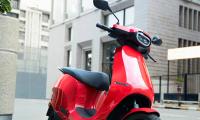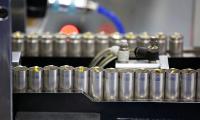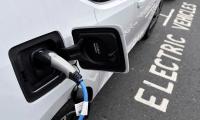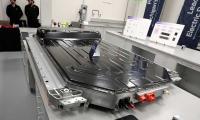Mahindra Group to Partner for Cell Production in India
Mahindra Group plans to partner with global players for battery cell production in India to meet growing EV demand. The company also discussed plans for its electric vehicle arm, MEAL.
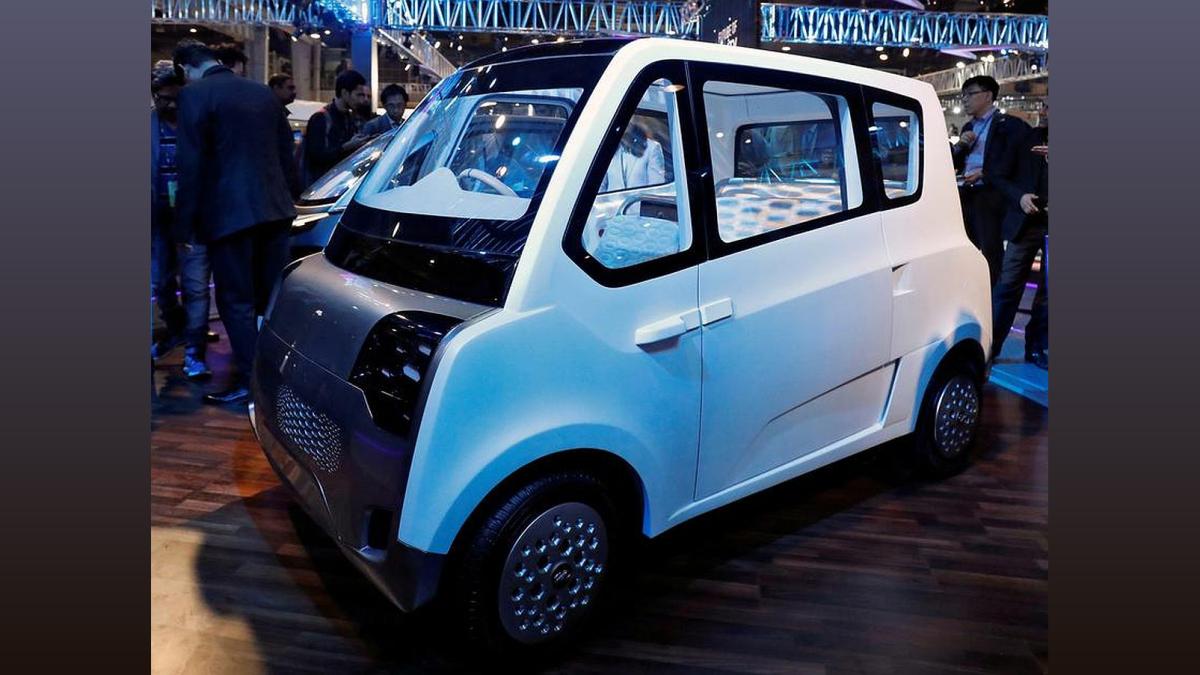
Photograph: Saumya Khandelwa/Reuters
New Delhi, Jun 16 (PTI) Mahindra Group is looking for partnerships with global players for local production of battery cells in order to cater to expected increase in demand for electric vehicles in the future, according to a top company executive.
In an interaction with PTI, Mahindra Group MD and CEO Anish Shah said the company is looking at a 2030 timeframe for the possible listing of its electric vehicle arm Mahindra Electric Automobile Ltd (MEAL).
"One area that we continue to look at more closely is cell manufacturing and that is something where there are various considerations... if we feel it's essential for us, we will look at a partnership for cell manufacturing," he stated.
He further said: "We will look at a global technology partner, and potentially at private equity partners as well because we will not put the entire capital." The initiative, if it materialises, would enable local production of battery cells in India, Shah said.
"..the only reason for us to do it is to indigenise in India. Therefore, if we go down that path, it will be in India," he said when asked if the production facility would come up in the country.
On plans to list MEAL, Shah stated that it is not going to happen in the next three-five years at least.
Electric segment needs time to take off, he stated.
"So this is something that we will probably look at in the 2030 timeframe or so," Shah noted.
He noted that the country has shown the ability to leapfrog when it comes to shift to new technologies especially in the automotive segment.
Shah said that EV products need to excite the customers at large.
"We believe that the launch of our new electric vehicle models starting January 2025 would play a key role in this aspect," he said.
He also listed range anxiety and high cost of EVs as some of the factors impacting the growth of the segment.
"What is not in place today is EV charging and that has to develop now. It's the right time to do it because as we start seeing the demand coming for electrics, EV charging infrastructure has to grow at a much higher scale," Shah said.
India has something like 27,000 chargers today while the US has around 1.76 lakh chargers and China will have many multiples of that, he noted.
"That is one big area of focus that will be required in India. Financing of EVs is the second area of focus," Shah said.
"We see our portfolio moving to 20-30 per cent electric by 2027...as charging infrastructure develops, more and more consumers will start getting into it. So we see this inflection point likely coming after about five years," Shah noted.
Mahindra Group plans to pump in Rs 37,000 crore over the next three years across business verticals with a major portion earmarked for the auto sector to introduce 23 new vehicles.
The company plans to introduce nine internal combustion engine (ICE) SUVs, seven battery electric vehicles (BEV) and seven light commercial vehicles by 2030.
When asked about hybrid models, Shah noted that Mahindra could come up with the technology "within a short time if that's what the consumer wants".
"We don't believe it is fair asking the government for incentives (for hybrids) unless there is a specific purpose behind it," he stated.
Incentives are meant for specific objectives, he said.
"The reasons for the transition (from ICE to EV) are fairly straightforward. The fuel import should be a lot lower, the environment should be a lot cleaner, and that is the reason why any government would want to transition to EVs," Shah said.
This is the reason why governments around the world have been providing incentives for EVs, he said.
In hybrid vehicles there are two powertrains and therefore it will always be more expensive than a model with single powertrain, Shah said.
Besides, the hybrid vehicles don't really make a difference from an environmental standpoint, he added.
"If you look at governments around the world in general, there have been no incentives for hybrids over the last 20 years...a consumer may want a hybrid product, but it will come at a higher price," he said.
He further said: "The question is whether that should be incentivised or not. And we feel that there isn't a rationale for that today." On diesel powertrains, Shah stated that it is up to the consumer to decide.
"If they want a diesel powertrain we will offer...If they want a petrol powertrain we will offer that, if they want a hybrid powertrain, which will likely be at a slightly higher cost, we will offer that," he stated.
He further noted: "Our sense is consumers will gravitate more towards electric models especially as ecosystem problems are sorted out because that will offer them a much better value proposition.
In an interaction with PTI, Mahindra Group MD and CEO Anish Shah said the company is looking at a 2030 timeframe for the possible listing of its electric vehicle arm Mahindra Electric Automobile Ltd (MEAL).
"One area that we continue to look at more closely is cell manufacturing and that is something where there are various considerations... if we feel it's essential for us, we will look at a partnership for cell manufacturing," he stated.
He further said: "We will look at a global technology partner, and potentially at private equity partners as well because we will not put the entire capital." The initiative, if it materialises, would enable local production of battery cells in India, Shah said.
"..the only reason for us to do it is to indigenise in India. Therefore, if we go down that path, it will be in India," he said when asked if the production facility would come up in the country.
On plans to list MEAL, Shah stated that it is not going to happen in the next three-five years at least.
Electric segment needs time to take off, he stated.
"So this is something that we will probably look at in the 2030 timeframe or so," Shah noted.
He noted that the country has shown the ability to leapfrog when it comes to shift to new technologies especially in the automotive segment.
Shah said that EV products need to excite the customers at large.
"We believe that the launch of our new electric vehicle models starting January 2025 would play a key role in this aspect," he said.
He also listed range anxiety and high cost of EVs as some of the factors impacting the growth of the segment.
"What is not in place today is EV charging and that has to develop now. It's the right time to do it because as we start seeing the demand coming for electrics, EV charging infrastructure has to grow at a much higher scale," Shah said.
India has something like 27,000 chargers today while the US has around 1.76 lakh chargers and China will have many multiples of that, he noted.
"That is one big area of focus that will be required in India. Financing of EVs is the second area of focus," Shah said.
"We see our portfolio moving to 20-30 per cent electric by 2027...as charging infrastructure develops, more and more consumers will start getting into it. So we see this inflection point likely coming after about five years," Shah noted.
Mahindra Group plans to pump in Rs 37,000 crore over the next three years across business verticals with a major portion earmarked for the auto sector to introduce 23 new vehicles.
The company plans to introduce nine internal combustion engine (ICE) SUVs, seven battery electric vehicles (BEV) and seven light commercial vehicles by 2030.
When asked about hybrid models, Shah noted that Mahindra could come up with the technology "within a short time if that's what the consumer wants".
"We don't believe it is fair asking the government for incentives (for hybrids) unless there is a specific purpose behind it," he stated.
Incentives are meant for specific objectives, he said.
"The reasons for the transition (from ICE to EV) are fairly straightforward. The fuel import should be a lot lower, the environment should be a lot cleaner, and that is the reason why any government would want to transition to EVs," Shah said.
This is the reason why governments around the world have been providing incentives for EVs, he said.
In hybrid vehicles there are two powertrains and therefore it will always be more expensive than a model with single powertrain, Shah said.
Besides, the hybrid vehicles don't really make a difference from an environmental standpoint, he added.
"If you look at governments around the world in general, there have been no incentives for hybrids over the last 20 years...a consumer may want a hybrid product, but it will come at a higher price," he said.
He further said: "The question is whether that should be incentivised or not. And we feel that there isn't a rationale for that today." On diesel powertrains, Shah stated that it is up to the consumer to decide.
"If they want a diesel powertrain we will offer...If they want a petrol powertrain we will offer that, if they want a hybrid powertrain, which will likely be at a slightly higher cost, we will offer that," he stated.
He further noted: "Our sense is consumers will gravitate more towards electric models especially as ecosystem problems are sorted out because that will offer them a much better value proposition.
You May Like To Read
TODAY'S MOST TRADED COMPANIES
- Company Name
- Price
- Volume
- Vodafone-Idea-L
- 11.65 (+ 3.56)
- 106772451
- Alstone-Textiles
- 0.28 ( -3.45)
- 44187760
- Mangalam-Industrial
- 0.88 ( -2.22)
- 39177573
- Sunshine-Capital
- 0.27 (+ 3.85)
- 35956340
- GMR-Airports
- 104.40 (+ 6.37)
- 30453005
